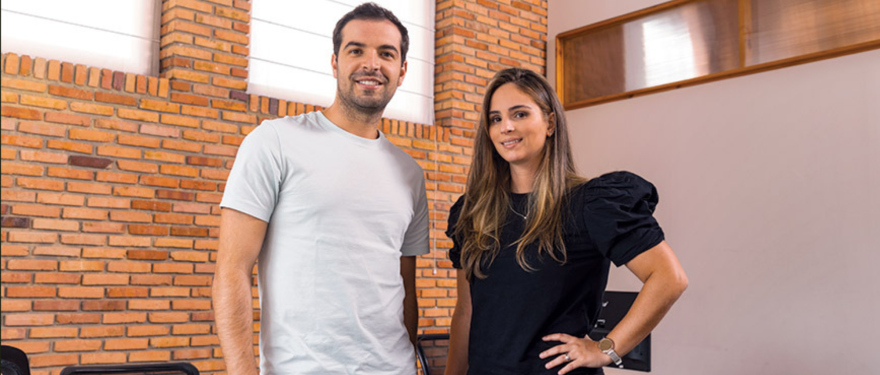For all their variety, restaurants have two things in common: a kitchen where food is prepared and a dining area where customers consume it. But what if you could use technology to ditch the dining area and just keep the kitchen, trimming the costs—and the complications—of getting a new restaurant off the ground?
That is exactly what Juan Azuero (MBA 2019) and Daniela Izquierdo (MBA 2019) are doing with Foodology, a foodtech startup with operations in Colombia, Mexico, Brazil, and Peru.
Azuero and Izquierdo both grew up in Bogotá, both worked as consultants prior to HBS, and both figured they would return to consulting afterward. But Izquierdo, who spent six months at an Italian culinary institute after high school, had long wanted to open her own eatery as a side venture. In the meantime, Azuero had been mulling entrepreneurial projects of his own.
In their final semester, the two enrolled in the course Challenges and Opportunities in the Restaurant Industry. In it, Izquierdo began sketching the outline of a tech-enabled business model that would eliminate everything she disliked about restaurants; namely, that they tend to be capital-intensive, risky, and difficult to scale.
“The industry is hard,” she says. “You need tons of money to get started. Almost all restaurants go broke after the first year. And very few people get beyond one or two locations.”
Azuero was intrigued, yet it wasn’t until the pair met for lunch back in Bogotá, following graduation, that they decided to make a go of it. They raised $500,000 from family and friends in 2019; picked up another $75,000 by winning the alumni track of the HBS New Venture Competition in 2020; and raised $4.5 million in seed funding three months later.
Foodology solves the capital, risk, and scalability problems inherent to conventional restos by dealing strictly in virtual brands that rely on “ghost” or “cloud” kitchens, that is, standalone cooking facilities that lack physical dining spaces and serve customers exclusively through delivery apps. A single cloud kitchen can produce dishes for multiple brands, eliminating the risk of placing one big bet on a single location or food concept. The model can scale up simply by adding more kitchens, and offerings can be tweaked rapidly in response to data-driven insights. For its part, Foodology uses machine-learning algorithms to identify opportunities and improve operations, analyzing what is already available for delivery in target markets and mining its own data to see what works and what doesn’t.
“We run A/B testing around price, around pictures, around menu descriptions,” says Izquierdo. “We track what our best sellers are and what our worst offenders are, and we’re constantly innovating with our menus and our brands.”
What began as a shoestring operation in a single kitchen in Bogotá (“the kitchen was the office, it was the commissary, it was everything,” Azuero recalls) is now a regional powerhouse with seven brands and 1,200 employees, spread across four countries. Foodology delivers 200,000 orders a month through apps such as Uber Eats and the Latin American unicorn Rappi, and it has fulfilled more than 2 million orders since launch.
According to Izquierdo, Latin America is an ideal environment for a virtual restaurant platform. The food-service market is valued at more than $200 billion but is nonetheless highly fragmented. While a handful of mega-brands like McDonald’s and Domino’s have thousands of branches, mid-size chains are rare; and 85 percent of establishments in a country such as Colombia are small, independent units. Those informal mom-and-pop joints often don’t show up on delivery apps, so hungry consumers have fewer options than their US counterparts. Azuero and Izquierdo aim to fill that gap with their own virtual brands, and the platform’s exponential growth suggests they are succeeding. Which is not to suggest it has been easy.
While the pandemic boosted demand for home delivery, it also forced the fledgling startup to navigate a business environment that was suddenly characterized by fear and uncertainty. And unlike traditional restaurants, Foodology’s app-based brands—which offer everything from salad bowls fortified with kale, quinoa, and salmon to traditional Colombian breakfasts packed with rice, beans, and chorizo—cannot rely on customers wandering in off the street. Instead, curious eaters must be enticed to order through Instagram photos and online reviews. “We’re promoting digital brands, and people need to trust those brands without knowing them,” Azuero says. “Getting that first client, that first user, is harder.”
Still, he and Izquierdo are bullish on their prospects, as are investors: Last summer, the company raised $15 million in Series A funding led by Andreessen Horowitz and the Brazilian venture fund Base Partners.
In addition to developing its own brands, Foodology has begun cultivating partnerships with established industry players such as Amor Perfecto, a leading Colombian coffee roaster. And Azuero and Izquierdo are confident they can build a multibillion-dollar business capable of identifying the next big food trend and propagating it across a vast network of cloud kitchens.
“We only have 80 kitchens right now,” Azuero says. “We believe we can easily fit 1,000 into the region.”
This article was originally published in the HBS Alumni Bulletin. Photo by Jorge Oviedo.

